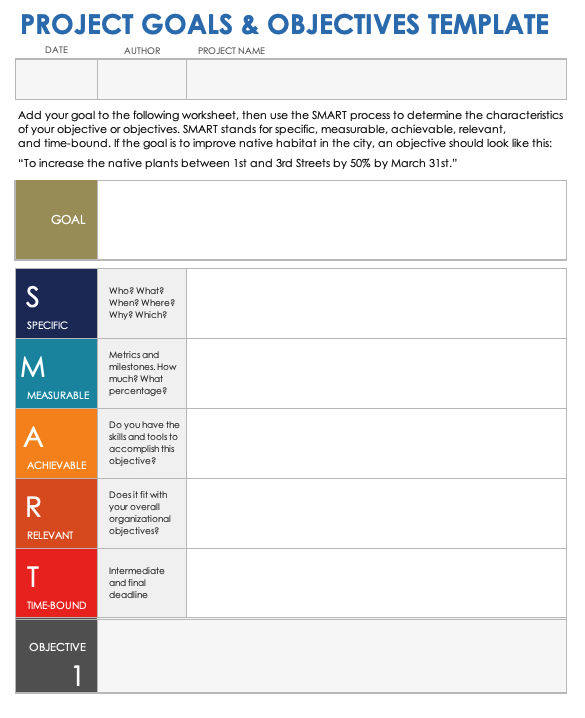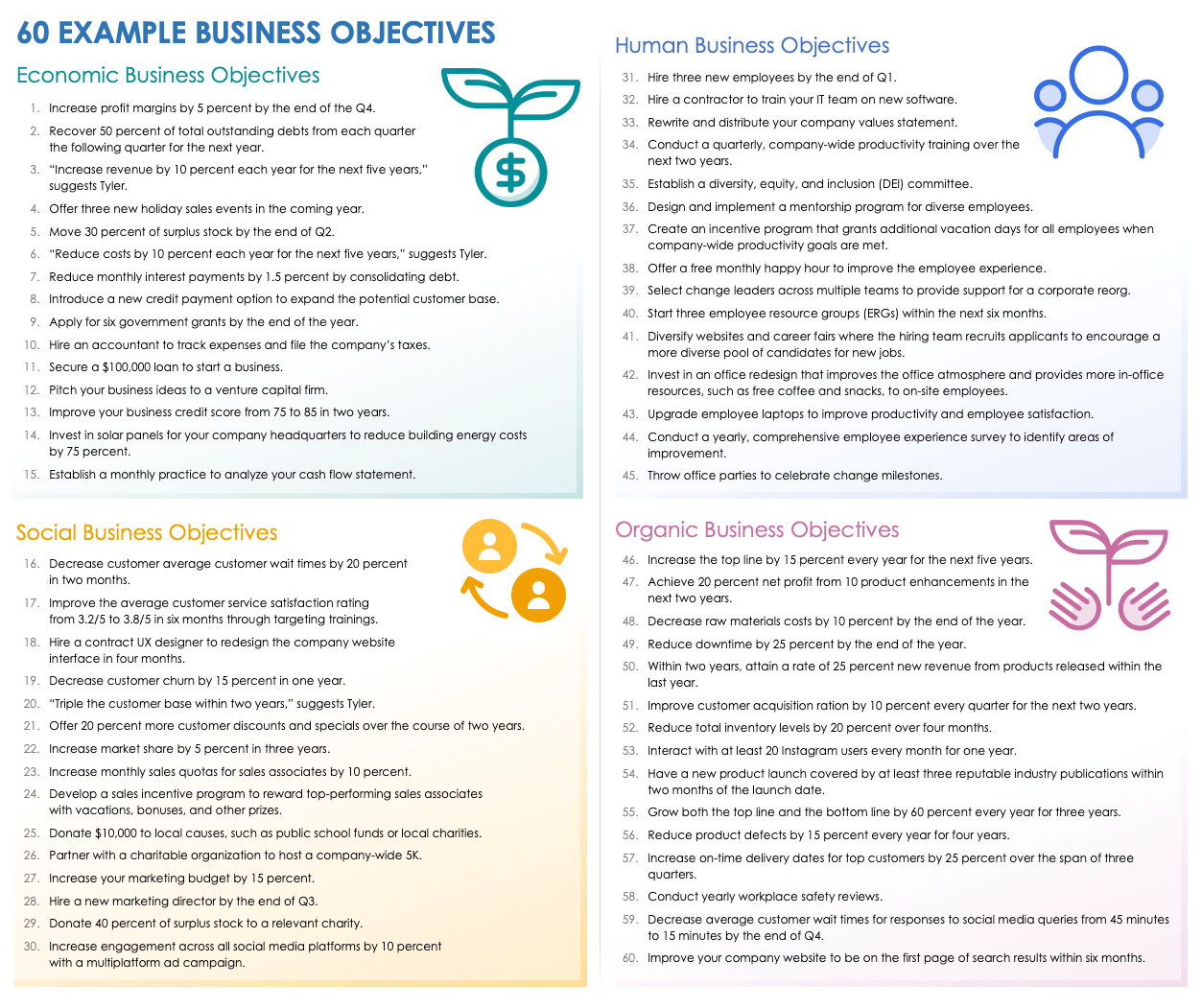What Is a Business Objective?
A business objective is a specific, measurable outcome that a company works to achieve. Company leaders set business objectives that help the organization meet its long-term goals. Business objectives should be recorded so that teams can easily access them.
Business objectives cover many different factors of a company’s success, such as financial health, operations, productivity, and growth.
One easy way to make sure that you are setting the right business objectives is to follow the SMART goal framework. SMART objectives are specific, measurable, achievable, relevant, and time-bound.
To learn about setting project objectives using the SMART framework, see this comprehensive guide to writing SMART project objectives.
Business Objectives vs. Business Goal
A business goal is a broad, long-term outcome that a company works toward. Goals usually inform which strategies that department leaders will implement. A business objective, however, is a specific, short-term outcome or action that helps the company achieve long-term goals.
Although the terms are often used interchangeably, goals and objectives are not the same. In general, goals are broad in scope and describe an outcome, while objectives are narrow in scope and describe a specific action or step.
While these differences are important to understand, many of the common frameworks for successful goal-setting — such as SMART, objectives and key results (OKRs), and management by objectives (MBO) — can be useful when writing business objectives.
When deciding on objectives for a team or department, keep in mind the overarching goals of a business. Each objective should move the company closer to its long-term goals.
Project Goals and Objectives Template
Download the Project Goals and Objectives Template for
Excel | Microsoft Word | Adobe PDF
Use this free, printable template to learn how to break down project goals into individual objectives using the SMART framework. Write the primary goal at the top of the worksheet, then follow the SMART process to create one or more specific objectives that will help you achieve that goal.
For resources to help with setting and tracking goals at your company, see this all-inclusive list of goal tracking and setting templates.
What Are the Four Main Business Objectives?
The four main business objectives are economic, social, human, and organic. Each can help a business ensure their prolonged health and growth. For example, human objectives refer to employees’ well-being, while economic objectives refer to the company’s financial health.
These are the four main business objectives:
- Economic Business Objective: Also called financial objectives, economic objectives relate to the financial health and growth of the company. These objectives can involve profits, revenue, costs, cash flow, sustainable growth, debt management, and investments.
- Example: Reduce spending on paid advertisements by 20 percent.
- Social Business Objective: Also called customer relations or customer-centric objectives, social objectives relate to customers’ image of and relationship with the company. These objectives can involve market share, competitive positioning, customer satisfaction, brand awareness, sales, and customer churn.
- Example: Reduce average customer wait times from eight minutes to four minutes.
- Human Business Objective: Also called internal objectives, human objectives relate to employees’ well-being and satisfaction. These can involve employee retention, hiring and growth, company culture, change management, productivity, employee engagement, and diversity, equity, and inclusion (DEI).
- Example: Hire two new chemical engineers by the end of Q2.
- Organic Business Objective: Also called development objectives, organic objectives relate to the overall health of the business. These can involve innovation, production, growth models, and reputation.
- Example: Improve the efficiency of a specific software product by 15 percent.
The Importance of Having Business Objectives
Teams need business objectives to stay focused on the company’s long-term goals. Business objectives help individual employees understand how their roles contribute to the larger mission of the organization. Setting business objectives facilitates effective planning.
Here are some benefits to setting business objectives:
- Encourages Feedback and Reflection: By writing down and tracking objectives, teams have a better sense of how they are progressing toward their goals.
- “Setting long-term goals will help ensure that your business remains viable, active, and relevant,” says Sully Tyler, Founder and CEO of SullyTyler.com. “Having objectives allows you to constantly evaluate whether or not you're succeeding in meeting them. This continuous feedback is essential in helping businesses stay focused and motivated.”
- Develops Leadership: Company leaders are more effective when they have a clear vision and can delegate tasks to make it a reality. Setting objectives is a great way to improve one’s leadership skills.
- Increases Motivation: People tend to be more invested in work when they have clear, attainable objectives to achieve. Plus, each completed objective provides a morale boost to keep teams happy and productive.
- Encourages Innovation and Productivity: With increased motivation and workplace satisfaction come more innovations. Set attainable but challenging objectives, and watch teams come up with creative solutions to get things done.
- Improves Strategy: Setting objectives that align with overarching company goals means that everyone across the company can stay aligned on strategic implementation.
- Enhances Customer Satisfaction: Overall customer satisfaction is more likely to increase over time when measurable quality improvements are in place.
- Improves Prioritization: When they are being able to see all of the current objectives, team members can more easily prioritize their work, which in turn makes their workloads feel more manageable.
- Improves Financial Health: Setting economic objectives in particular can help companies stay on top of their financial goals.
Track the Progress of Business Objectives with Smartsheet
Empower your people to go above and beyond with a flexible platform designed to match the needs of your team — and adapt as those needs change.
The Smartsheet platform makes it easy to plan, capture, manage, and report on work from anywhere, helping your team be more effective and get more done. Report on key metrics and get real-time visibility into work as it happens with roll-up reports, dashboards, and automated workflows built to keep your team connected and informed.
When teams have clarity into the work getting done, there’s no telling how much more they can accomplish in the same amount of time. Try Smartsheet for free, today.


